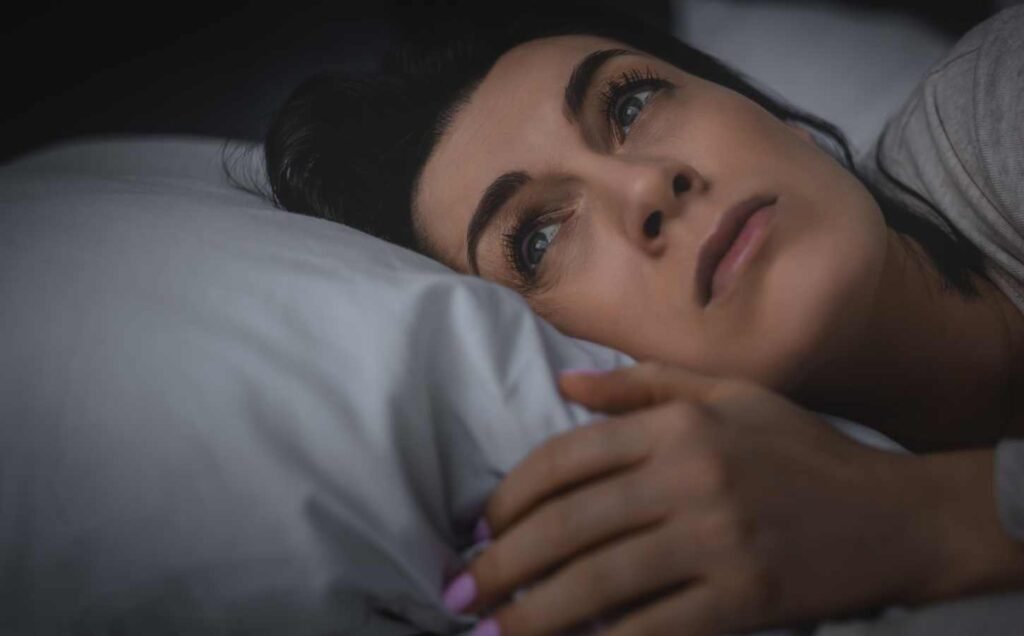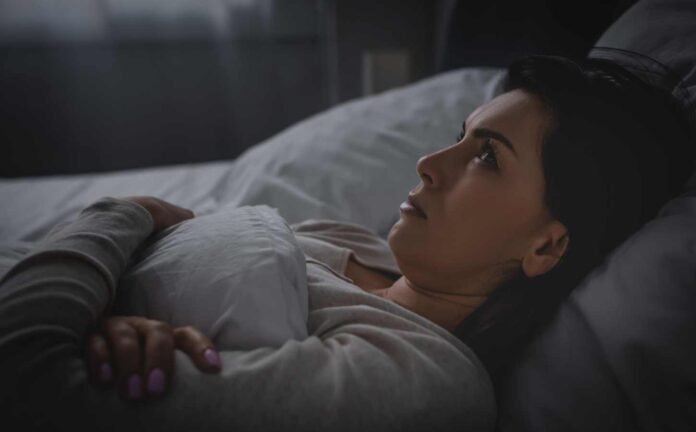Many people struggle with getting a good night’s sleep, and it can be frustrating when you can’t seem to fall asleep no matter what you do.
If you have just typed in to your search engine “I Can’t Sleep What Should I Do?” you are in the right place. Sit back and let me explain some of the most common reasons that people can’t sleep. Insomnia, or the inability to fall asleep or stay asleep, can have a negative impact on both your physical and mental health. It’s important to address the issue and find ways to improve your sleep habits.
There are many factors that can contribute to difficulty sleeping, including stress, anxiety, poor sleep hygiene, and medical conditions. It’s important to identify the root cause of your sleep troubles in order to address them effectively. While there are many over-the-counter sleep aids available, it’s important to speak with a healthcare professional before taking any medication to ensure it’s safe and effective for you.
Improving sleep hygiene can also be an effective way to improve your ability to fall asleep. This includes creating a relaxing bedtime routine, avoiding screens before bed, keeping your bedroom cool and dark, and avoiding caffeine and alcohol before bedtime. By making changes to your sleep habits and addressing any underlying issues, you can improve your chances of getting a good night’s sleep.
Understanding Sleep and Insomnia
The Science of Sleep
Sleep is a vital physiological process that allows the body to rest and rejuvenate. During sleep, the body repairs and restores itself, and the brain consolidates memories and processes information. The sleep-wake cycle is regulated by the circadian rhythm, a natural internal clock that controls the timing of sleep and wakefulness.
Common Causes of Insomnia
Insomnia is a sleep disorder characterized by difficulty falling asleep, staying asleep, or waking up too early. It can be caused by a variety of factors, including anxiety, depression, sleep apnea, chronic pain, medical conditions, and certain medications. Lifestyle factors such as caffeine, alcohol, and nicotine can also contribute to insomnia.
Effects of Sleep Deprivation on Health
Sleep deprivation can have serious effects on health and well-being. Chronic sleep deprivation has been linked to an increased risk of obesity, diabetes, heart disease, and stroke. It can also impair cognitive function, memory, and mood, and increase the risk of accidents and injuries.
In conclusion, understanding sleep and insomnia is crucial for maintaining optimal health and well-being. By identifying the causes of insomnia and addressing them through lifestyle changes, therapy, or medication, individuals can improve their sleep quality and overall health.
Lifestyle Adjustments for Better Sleep
Getting a good night’s sleep is essential for overall health and well-being. Making lifestyle adjustments can be an effective way to improve sleep quality. The following subsections provide some tips on how to make these adjustments.
Dietary Considerations
Diet can have a significant impact on sleep quality. Consuming caffeine, especially in the evening, can make it difficult to fall asleep. Alcohol consumption may also affect sleep quality, leading to fragmented sleep. It is recommended to avoid consuming caffeine and alcohol at least four hours before bedtime.
Eating a heavy meal close to bedtime can also disrupt sleep. It is recommended to have dinner at least two to three hours before bedtime. Additionally, consuming foods high in sugar or refined carbohydrates can cause blood sugar spikes and crashes, leading to disrupted sleep.
The Role of Physical Activity
Regular physical activity can improve sleep quality. Exercise helps to reduce stress and anxiety, which can interfere with sleep. It is recommended to engage in physical activity at least three hours before bedtime to allow the body to wind down before sleep.
However, it is important to note that exercising too close to bedtime can have the opposite effect and make it difficult to fall asleep.
Creating a Restful Environment
Creating a restful sleep environment can help to improve sleep quality. A regular sleep schedule can help to regulate the body’s internal clock, making it easier to fall asleep and wake up at the same time each day.
A comfortable mattress and bedding can also contribute to better sleep. Pillows should be replaced every one to two years, and mattresses every seven to ten years. Additionally, the sleep environment should be cool, quiet, and dark to promote restful sleep.
Making lifestyle changes can be an effective way to improve sleep quality. By making dietary adjustments, engaging in physical activity, and creating a restful sleep environment, individuals can improve their chances of getting a good night’s sleep.
Pre-Sleep Routine to Promote Relaxation
Establishing a pre-sleep routine can help promote relaxation and improve sleep quality. Here are some tips for creating a calming bedtime routine:
Relaxation Techniques
Relaxation techniques such as deep breathing, progressive muscle relaxation, and visualization can help reduce stress and anxiety, making it easier to fall asleep. Deep breathing involves taking slow, deep breaths and exhaling slowly, while progressive muscle relaxation involves tensing and releasing different muscle groups. Visualization involves imagining a peaceful scene or calming image.
Bath or Shower
Taking a warm bath or shower before bed can help relax the body and mind. Adding Epsom salts or essential oils to the bath can also enhance relaxation.
Reading or Journaling
Reading a book or writing in a journal can help calm the mind and reduce stress. It is important to avoid reading or writing about stimulating or stressful topics before bed.
Meditation
Meditation is a mindfulness practice that involves focusing on the present moment and letting go of distracting thoughts. It can help reduce stress and improve sleep quality. Body scan meditation is a type of meditation that involves focusing on each part of the body and releasing tension.
Yoga
Yoga is a gentle form of exercise that can help reduce stress and promote relaxation. Practicing yoga before bed can help calm the mind and prepare the body for sleep.
Incorporating these techniques into a pre-sleep routine can help promote relaxation and improve sleep quality. It is important to establish a consistent bedtime routine and avoid stimulating activities before bed.
Managing Sleep Disturbances
Dealing with Anxiety and Stress
Anxiety and stress can make it difficult to fall asleep or stay asleep. To manage anxiety and stress, individuals can try relaxation techniques such as deep breathing exercises, progressive muscle relaxation, or meditation. Engaging in physical activities like yoga, tai chi, or regular exercise can also help reduce stress levels.
Additionally, it’s important to establish a consistent bedtime routine that helps calm the mind and signal to the body that it’s time to sleep. This can include activities such as taking a warm bath, reading a book, or listening to calming music.
Addressing Physical Discomfort
Physical discomfort can also contribute to sleep disturbances. Chronic pain, aging, and restless legs syndrome can all make it difficult to get comfortable and fall asleep. To address physical discomfort, individuals can try using a comfortable mattress and pillows that provide adequate support. They can also try using earplugs to block out any noise that may be keeping them awake.
If physical discomfort persists, it may be helpful to speak with a healthcare provider to explore additional treatment options.
Overall, managing sleep disturbances requires a combination of addressing both psychological and physical factors that may be contributing to sleep difficulties. By implementing relaxation techniques and addressing physical discomfort, individuals can increase their chances of getting a good night’s sleep.
Technological and Environmental Factors
Minimizing Exposure to Blue Light
Blue light emitted by electronic devices such as phones and screens can interfere with the body’s natural sleep-wake cycle, making it difficult to fall asleep. To minimize exposure to blue light, individuals can:
- Use blue light filters on their electronic devices
- Avoid using electronic devices for at least an hour before bedtime
- Invest in blue light blocking glasses
Optimizing Your Sleep Space
The sleep environment plays a crucial role in promoting restful sleep. Some tips for optimizing the sleep space include:
- Keeping the bedroom cool and comfortable
- Minimizing noise and distractions
- Using blackout curtains or eye masks to block out light
- Removing electronic devices from the bedroom
In addition to the above, individuals should also consider the impact of temperature on their sleep. Keeping the bedroom temperature between 60-67°F can promote deeper and more restful sleep.
Overall, by taking steps to minimize exposure to blue light and optimizing the sleep environment, individuals can improve the quality and duration of their sleep.
Professional and Medical Interventions
When to Consult a Sleep Specialist
If you have tried various self-help methods and still experience difficulty sleeping, it may be time to consult a sleep specialist. A sleep specialist is a healthcare professional who specializes in diagnosing and treating sleep disorders. They can help identify the underlying cause of your sleep problems and recommend appropriate treatment options.
Consulting a sleep specialist is especially important if you experience any of the following:
- Chronic insomnia that lasts for more than a few weeks
- Daytime sleepiness or fatigue that interferes with daily activities
- Loud snoring, gasping, or choking during sleep
- Frequent awakenings during the night
- Difficulty falling asleep or staying asleep
- Unusual behaviors during sleep, such as sleepwalking or night terrors
Medications and Therapies
In addition to self-help techniques, there are several medical interventions that can help improve sleep. These include medications and therapies such as cognitive behavioral therapy (CBT) and light therapy.
Medications can be useful in treating short-term insomnia, but they should be used with caution and only under the guidance of a healthcare professional. Common sleep medications include benzodiazepines, non-benzodiazepine hypnotics, and melatonin receptor agonists. It is important to note that sleep medications can have side effects and may be habit-forming.
Cognitive behavioral therapy (CBT) is a type of talk therapy that can be effective in treating chronic insomnia. CBT helps identify and change negative thoughts and behaviors that may be contributing to sleep problems. It can also teach relaxation techniques and improve sleep hygiene.
Light therapy involves exposure to bright light in the morning or evening to help regulate the body’s circadian rhythm. This can be particularly helpful for individuals with sleep disorders related to shift work or seasonal changes.
Overall, it is important to consult with a healthcare professional before beginning any medical interventions for sleep problems. They can help identify the underlying cause of your sleep problems and recommend appropriate treatment options.
Supplemental Strategies for Sleep Improvement
Natural Supplements and Herbs
For those struggling with sleep, natural supplements and herbs can be a useful tool to help promote relaxation and improve sleep quality. One such supplement is melatonin, a hormone naturally produced by the body that regulates sleep-wake cycles. Melatonin supplements can be effective for individuals who have trouble falling asleep or staying asleep.
Another option is herbal tea, which can be a relaxing and soothing beverage to enjoy before bed. Chamomile tea, in particular, has been shown to have calming effects and can help improve sleep quality.
It is important to note, however, that while natural supplements and herbs can be helpful, they should not be relied upon as a sole solution for sleep problems. It is always best to consult with a healthcare professional before starting any new supplement or herb regimen.
Incorporating Naps Wisely
Napping can be a helpful way to combat fatigue and improve alertness during the day. However, napping too much or at the wrong time can disrupt nighttime sleep and make it harder to fall asleep at night.
To incorporate naps wisely, it is important to keep them short and avoid napping too close to bedtime. A 20-30 minute nap in the early afternoon can be a great way to recharge and improve productivity without interfering with nighttime sleep.
Overall, natural supplements and herbs as well as strategic napping can be effective supplemental strategies for improving sleep. However, it is important to remember that these strategies should be used in conjunction with healthy sleep habits and under the guidance of a healthcare professional.
Monitoring Progress and Adjustments
Keeping a Sleep Diary
One effective way to monitor progress and make adjustments is to keep a sleep diary. By recording the time you go to bed, the time you wake up, and how long it takes you to fall asleep, you can identify patterns and make changes accordingly. Additionally, keeping track of factors that may affect your sleep, such as caffeine intake or exercise, can help you make informed decisions about your sleep habits.
A sleep diary can also be a helpful tool for healthcare professionals when evaluating your sleep concerns. By bringing a detailed record of your sleep patterns and habits to your appointments, you can work together to identify potential solutions.
Evaluating and Tweaking Habits
In addition to keeping a sleep diary, evaluating and tweaking sleep habits can also lead to improved sleep. This can include behavioral changes such as limiting screen time before bed, creating a relaxing bedtime routine, and avoiding naps during the day.
It is important to note that changes may not happen overnight and may require patience and consistency. It may also be helpful to seek support from a healthcare professional or sleep specialist to develop a personalized plan for improving sleep habits.
By monitoring progress and making adjustments, individuals can take steps towards achieving better sleep and improving overall health and well-being.
Frequently Asked Questions
What are some techniques to try when you’re lying in bed but can’t fall asleep?
There are several techniques you can try when you’re having trouble falling asleep. One is to practice relaxation techniques such as deep breathing or progressive muscle relaxation. Another is to create a comfortable sleep environment by adjusting the temperature, reducing noise and light, and using comfortable bedding. You can also try reading a book or listening to calming music to help you relax.
What could be causing my inability to sleep even when I feel tired?
There are many factors that can contribute to difficulty sleeping, including stress, anxiety, depression, certain medications, and medical conditions such as sleep apnea or restless leg syndrome. It’s important to speak with a healthcare professional if you’re experiencing persistent sleep problems.
How can I calm my mind when I can’t sleep in the middle of the night?
If you’re struggling to calm your mind at night, it can be helpful to practice relaxation techniques such as deep breathing or meditation. You can also try writing down your thoughts or worries in a journal to help clear your mind. Avoiding stimulating activities before bed, such as using electronic devices or watching TV, can also help calm your mind.
Are there any strategies to help me fall asleep when I have to wake up early?
If you need to wake up early but are having trouble falling asleep, it can be helpful to establish a consistent sleep routine and stick to it. This can include going to bed and waking up at the same time each day, avoiding caffeine and alcohol before bed, and creating a relaxing bedtime routine.
Why does my body stay awake even when I have my eyes closed and want to sleep?
There are several factors that can contribute to difficulty falling asleep, including stress, anxiety, and medical conditions such as sleep apnea or restless leg syndrome. It’s important to speak with a healthcare professional if you’re experiencing persistent sleep problems.
What are effective ways to relax and induce sleep when you’re struggling to do so?
There are several techniques you can try to help you relax and fall asleep, including deep breathing, progressive muscle relaxation, and meditation. Creating a comfortable sleep environment, such as adjusting the temperature and reducing noise and light, can also help induce sleep. It’s important to find what works best for you and to establish a consistent sleep routine.
Understanding Circadian Rhythm: The Body’s Natural Clock Explained

Circadian rhythms are physical, mental, and behavioral changes that follow a roughly 24-hour cycle, responding primarily to light and darkness in an organism’s environment. These rhythms are driven by an internal biological clock, which is known as the circadian clock or the biological clock.
Continue reading: Understanding Circadian Rhythm
Insomnia Explained: Effective Strategies for a Better Sleep

Insomnia is a prevalent sleep disorder marked by difficulty falling asleep or staying asleep. Acute insomnia typically lasts for a brief period, often triggered by stress or significant life events. In contrast, chronic insomnia endures for at least three months and occurs at least three times per week.
Studies show that 10% to 30% of adults experience insomnia at some stage in their lives, with chronic insomnia affecting 6% to 10% of the population. Insomnia can affect people of all ages but is more common among older adults and women.
Continue reading: Insomnia Explained
PUREDOSE Micelle Liposomal Magnesium: Unlock Vitality and Restful Sleep – Review

Developed by health professionals, PUREDOSE Micelle Liposomal Magnesium revitalizes your energy by restoring magnesium levels. Its cutting-edge liposomal delivery method guarantees superior absorption for the greatest effect. Essential for more than 300 bodily processes, this crucial mineral not only enhances energy and soothes muscles but also significantly contributes to achieving peaceful sleep.
A review: PUREDOSE Micelle Liposomal Magnesium
MaryRuth Organics Sleep Gummies Without Melatonin Review: Do They Work?

These gummies are designed to promote relaxation and support sleep quality for adults. Unlike many other sleep aids, they don’t contain melatonin, so you won’t wake up feeling groggy or drowsy.
Continue reading: MaryRuth Organics Sleep Gummies Without Melatonin
Melatonin: Is it a Safer Solution for Sleep Disorders Compared to Traditional Treatments?

Melatonin is a crucial hormone that plays a significant role in regulating the sleep-wake cycle and circadian rhythms. It is essential to differentiate between natural and supplemental melatonin, as well as to understand its production in the pineal gland.
Continue reading: Melatonin: Is it a Safer Solution for Sleep Disorders




